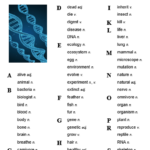Biology Terms That Start With U
1. Ubiquitin: A small protein that helps regulate the degradation of other proteins.
2. UDP-glucose: A molecule important in carbohydrate metabolism.
3. Ulna: One of the two bones of the forearm, located on the pinky side.
4. Ultrafiltration: A process by which fluid and small molecules are filtered through a semipermeable membrane.
5. Unicellular: An organism consisting of a single cell.
6. Unisexual: Having only one sex, either male or female.
7. Unsaturated fatty acids: Fatty acids that contain one or more double bonds between carbon atoms.
8. Uracil: One of the four nucleobases in RNA, replacing thymine found in DNA.
9. Ureters: Tubes that transport urine from the kidneys to the bladder.
10. Urethra: A tube that carries urine from the bladder to the outside of the body.
11. Uric acid: A waste product formed from the breakdown of purines in the body.
12. Urinary bladder: An organ that stores urine before it is excreted.
13. Urinary system: A system responsible for eliminating waste products from the body.
14. Uropod: A specialized appendage found in some arthropods, used for swimming or crawling.
15. Uterus: The female reproductive organ that houses a developing fetus during pregnancy.
16. Utricle: A fluid-filled chamber in the inner ear involved in sensing linear acceleration.
17. U-V radiation: Ultraviolet radiation from the sun, harmful at high levels.
18. Ultrasonography: The use of high-frequency sound waves to produce images of the internal body structures.
19. Uvea: The middle layer of the eye, consisting of the iris, ciliary body, and choroid.
20. Utricularia: A genus of carnivorous plants commonly known as bladderworts.
21. Urate: The salt or ester of uric acid.
22. Uptake: The process of absorbing molecules or ions into cells.
23. Urushiol: An allergenic oily compound found in plants like poison ivy and poison oak.
24. Ultrastructure: The fine details of a cell or tissue observed via electron microscopy.
25. Uniparental inheritance: Transmission of genetic material from a single parent.
26. UV protection: Measures adopted to shield organisms from harmful ultraviolet radiation.
27. Utricular gland: A type of gland found in the stomach lining that produces mucus.
28. Usher syndrome: A genetic disorder characterized by deafness and progressive vision loss.
29. Umbilical cord: The flexible cord connecting a fetus to the placenta in the womb.
30. Uropoiesis: The process of urine formation by the kidneys.
More About Biology Terms That Start With U
Welcome to an enriching journey through the fascinating world of biology, where we explore the vast array of terms that not only define the science but also contribute to the very essence of life. In this installment, we shall embark on a unique voyage to discover biology terms starting with the letter “U.”
Biology, the study of living organisms and their interactions with the environment, encompasses a vast array of branches and sub-disciplines. Whether you are an avid biology enthusiast or simply interested in expanding your knowledge, this exploration of biology terms beginning with “U” will provide you with concise and intriguing insights.
Our journey begins with the term “Ubiquitin,” a small protein found in all eukaryotic cells. Ubiquitin performs a crucial role in cellular processes, such as protein degradation, cell cycle control, and DNA repair. Understanding ubiquitin’s mechanisms can illuminate various areas of biology, including cancer research and neurodegenerative disorders.
Moving forward, we delve into the realm of “Ultraviolet (UV) Radiation.” This high-energy electromagnetic radiation falls outside the visible spectrum, encompassing wavelengths shorter than those of visible light. UV radiation affects living organisms in various ways, from harmful effects such as DNA damage and carcinogenesis to beneficial roles, such as the synthesis of vitamin D in humans.
Another fascinating term is “Unicellular,” which refers to organisms composed of a single cell. Unicellular organisms, such as bacteria, archaea, and some protists, have captivated scientists for centuries with their remarkable ability to carry out all life functions within a solitary cell. Studying these organisms helps us understand fundamental processes that underpin complex multicellularity.
Let us not forget the “Uracil” nucleobase, a fundamental component of RNA (ribonucleic acid). Uracil replaces thymine, found in DNA, and plays a crucial role in protein synthesis and other biochemical processes. Understanding uracil’s functions enhances our comprehension of RNA structure, genetic expression, and various diseases related to RNA dysfunction.
Contemplating the intricate interplay of organisms within an ecosystem brings us to the concept of “Understanding Biodiversity.” This term encompasses the variety of life forms found within a specific habitat, ranging from the smallest microorganisms to larger plants and animals. Recognizing and appreciating biodiversity is vital for its conservation, as well as for understanding the delicate balance that sustains life on our planet.
As our journey progresses, we encounter the captivating “Umbilical Cord.” This unique structure connects the developing fetus to the placenta, facilitating the exchange of nutrients, oxygen, and waste products between the mother and the unborn child. Understanding the complexities and functions of the umbilical cord contributes to the field of prenatal and obstetric medicine.
The exploration of biology terms beginning with “U” would be incomplete without shedding light on “Uterus.” This muscular organ, found only in female mammals, houses and nourishes a developing fetus during pregnancy. The study of the uterus, its structure, and functions is crucial to reproductive biology and health, including infertility research and obstetrics.
Lastly, we delve into the realm of population genetics through the term “Uniformitarianism.” This principle asserts that the processes shaping our natural world have remained relatively constant throughout time. Understanding uniformitarianism enables us to uncover genetic patterns, investigate evolutionary mechanisms, and make predictions about future changes in the biological world.
This introductory glimpse into biology terms beginning with “U” offers a taste of the diversity and intricacy that defines this awe-inspiring field. Join us on this journey as we unfold the wonders of biology, one letter at a time. Stay tuned for our upcoming articles, where we shall delve deeper into each of these captivating terms and their implications in our understanding of life itself.
Biology Terms That Start With U FAQs:
1. Q: What is an umbilical cord?
A: The umbilical cord is a flexible structure that connects a developing fetus to the placenta, allowing for the exchange of nutrients, oxygen, and waste products between the mother and baby.
2. Q: What is the purpose of the urinary system?
A: The urinary system, composed of the kidneys, ureters, bladder, and urethra, is responsible for filtering and eliminating waste products, controlling fluid balance, and regulating blood pressure.
3. Q: What is an ultraviolet (UV) radiation?
A: Ultraviolet radiation refers to the high-energy electromagnetic waves emitted by the sun or artificial sources. It is invisible to the human eye and can cause skin damage, including sunburn and increased risk of skin cancer.
4. Q: What is the role of the urea cycle?
A: The urea cycle is a metabolic pathway that takes place in the liver, converting toxic ammonia into urea, which can be safely eliminated by the kidneys. This process is crucial for maintaining nitrogen balance in the body.
5. Q: What is a unicellular organism?
A: A unicellular organism is an organism consisting of only one cell. Examples include bacteria, yeasts, and protozoans, which can carry out all life processes within this single cell.
6. Q: What is a uracil?
A: Uracil is one of the four nitrogenous bases found in RNA molecules. It pairs with adenine during the process of transcription, allowing for the synthesis of RNA from DNA templates.
7. Q: What is an ultrafiltration?
A: Ultrafiltration is a process in which large molecules and particles, such as proteins and cells, are separated from smaller ones based on their size via a semipermeable membrane. This technique is often used in dialysis or water purification systems.
8. Q: What is the function of a ureter?
A: Ureters are narrow tubes that transport urine from the kidneys to the bladder. They use peristaltic contractions to propel urine forward and prevent backflow.
9. Q: What is an unicellular gland?
A: An unicellular gland is a type of gland composed of a single secretory cell. These cells release their products directly into body cavities or onto the surface of an epithelium. Examples include goblet cells in the respiratory tract that secrete mucus.
10. Q: What is an echo-location in marine mammals?
A: Echo-location is a biological process used by marine mammals, such as dolphins and whales, to navigate and locate prey underwater. It involves emitting high-frequency sounds and interpreting the echoes that bounce back, providing information about their surroundings.

















